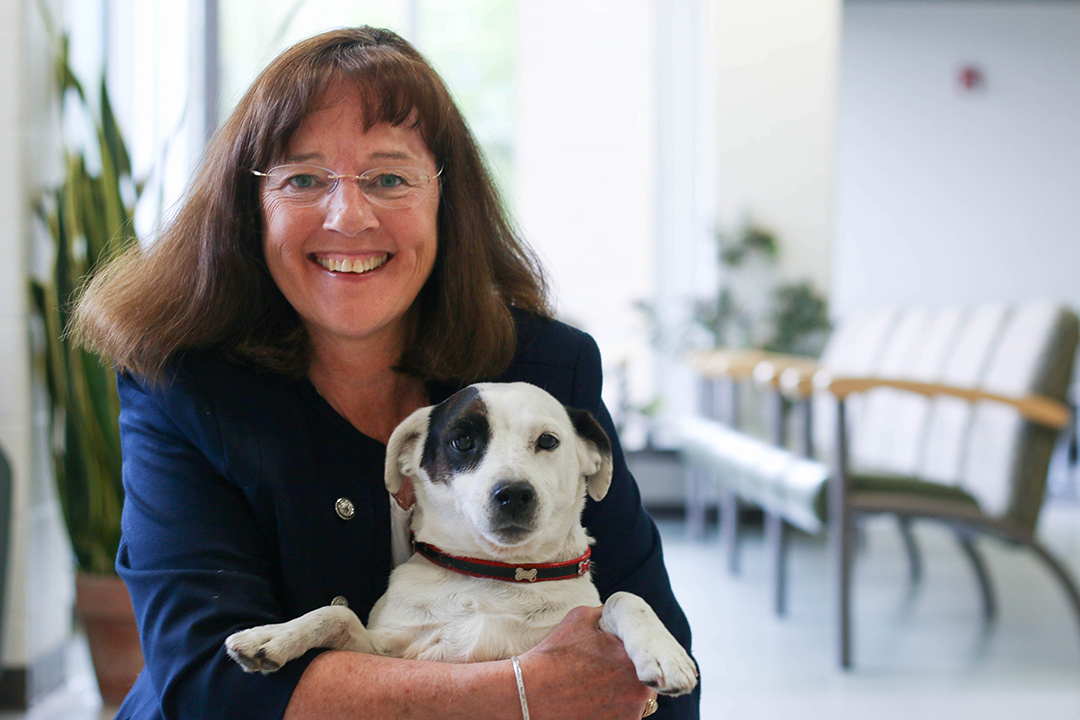
Dowling masters the art of change
It may seem unusual to walk away questioning your own judgments and biases after a conversation with a veterinary pharmacologist, but this is exactly the type of deep-thinking Dr. Trisha Dowling (DVM) inspires.
By Jeanette NeufeldAfter more than two decades of teaching, the Western College of Veterinary Medicine (WCVM) professor has turned traditional classroom learning upside down.
“You have all the books right here,” said Dowling, picking up her smartphone.
This recognition of the accessibility of information and an affinity for technology has led her down a different path for delivering lectures at the WCVM. Dowling uses a “flipped classroom” approach, inviting students to review the materials in advance with an online system called Perusall.
Before class, Dowling logs in and checks out how students are responding to the material—and to each other.
“When somebody doesn’t understand and the other student explains it to them and draws a diagram, I get tears in my eyes,” said Dowling.
Dowling then uses class time to work through clinical cases. She incorporates storytelling, videos, photos and podcast recordings into her lectures to ensure that her students’ knowledge of drugs is based on understanding rather than memorization.
“She’s had a major impact on a generation of veterinarians,” said Dr. Chris Clark (MVetSc), the WCVM’s associate dean (academic). He led Dowling’s nomination for the University of Saskatchewan’s (USask) Master Teacher Award, bestowed at the 2019 Fall Convocation ceremonies at Merlis Belsher Place.
Clark said Dowling deserves the award for her approach to veterinary pharmacology alone, but added her work in teaching USask graduate student courses and developing a veterinary mindfulness elective course are equally worthy of accolades.
Dowling’s success as a professor didn’t happen overnight: Dowling describes being “terrified” during her first days of teaching 25 years ago.
A self-described space brat, Dowling’s father built lunar modules in New Mexico before the family moved to Texas. Dowling earned her Doctor of Veterinary Medicine at Texas A&M University and then practised for a short time in Ohio and North Carolina. She went on to complete a residency in large animal internal medicine and earned a master’s degree in clinical pharmacology at Auburn University, earning double board certification in large animal internal medicine and clinical pharmacology.
After a decade of teaching, Dowling tapped into the resources available through USask’s Gwenna Moss Centre for Teaching and Learning. She also met her own “personal Yoda”—Dr. John Thompson (PhD), a retired professor of sociology at St. Thomas More College, and an award-winning teacher himself.
Through Thompson’s mentorship, Dowling took a graduate studies course called Thinking Critically. She has been instrumental in helping graduate students prepare for employment outside of academia.
In 2008, after enduring her own mental health struggles, she discovered mindfulness and developed a meditation and yoga practice. These healthy habits have allowed her to balance a full teaching load with clinical research and work as one of three Canadian veterinarians overseeing the Canadian Global Food Animal Residue Avoidance Databank.
She also sits on the equine medications committee for Equestrian Canada, delivers public education on antimicrobial stewardship, and teaches wellness and mindfulness practices to veterinarians and technicians across North America.
Dowling’s popular Mindful Veterinary Practice elective course allows third-year veterinary students to engage in self-care practices for credit. The skills developed go beyond students taking a break and extend to their own communication skills, particularly when dealing with clients.
“With mindfulness, you learn to check in with yourself and your state of mind before you walk in the door of the exam room,” she said. “And once in there, not only do you ask the client questions, but listen to the answers with an open mind and heart.”
And just like that, she makes you question yourself and how you see the world around you—the true mark of a successful teacher.

